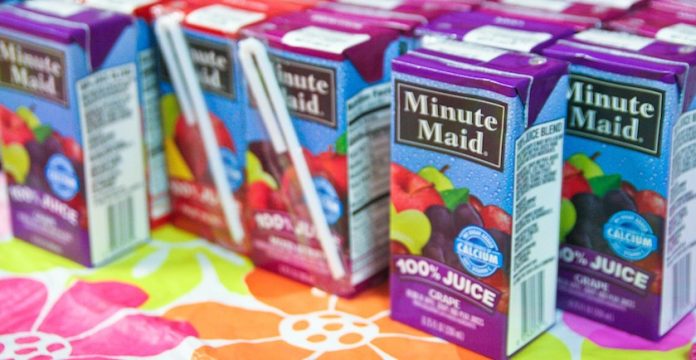
While the ultimate goal for optimum health is to eat nine servings of fruit and vegetables a day, it can be hard in our busy lives to achieve that goal. Fruit juice provides a convenient and easy way to help reach nutritional goals. But there is more to juice than meets the eye. Although some juices state that they are “all natural,” they may contain added sugars, preservatives, and even GMOs. Always look for juice that states “100% juice” on the label in order to avoid buying fruit juice that is mostly water and added sugars. Certified organic is the best.
Juice from concentrate is also known as fruit juice concentrate or concentrated juice, and it contains much less water than unconcentrated juice. A few more steps are used to produce fruit juice from concentrate, and those steps include adding and taking away certain chemicals and natural fruit byproducts so that a more condensed version of fruit juice is created. One of the processes used is a heat treatment to evaporate almost all of the water, leaving behind the natural fruit juice. Be aware that some concentrates can contain artificial additives, such as colors or preservatives.
Most juices sold on the market in the U.S., up to 98 percent, are pasteurized, including those from concentrate. Pasteurization is the process that heats food to a specific temperature to kill bacteria that may be harmful. In addition to reducing the potentially harmful bacteria, pasteurization of fruit juice can reduce some of the nutrients. A 2002 study on the effects of pasteurization on orange juice found that after pasteurization, 51 percent of the compounds “exhibited a statistically significant change in concentration.”
Both the U.S. Federal Drug Agency (FDA) and Health Canada consider unpasteurized juice to be unsafe. The reason they both post strong warnings against drinking unpasteurized juice is due to outbreaks of E. coli O157:H7 in the 1990s linked to unpasteurized juice. In 1996, there were three outbreaks of illness in the U.S. from E. coli O157:H7 that were linked to unpasteurized juice or cider. Two years later, there were seven confirmed cases of food borne illness from E. coli in Ontario, and unpasteurized juice or cider was suspected in the cases. A batch of unpasteurized non-commercial apple cider was identified as the most likely source.
Read more about how to prevent food borne illness
The FDA states on its website that “consuming untreated juices can pose health risks to your family.” The FDA particularly warns that food borne illnesses pose a greater risk to people with weaker immune systems, including children and the elderly. Since 1999, the FDA has required juice manufacturers to place warnings about the health risks of drinking untreated juice or cider.
Health Canada points out on its website that the likelihood of becoming ill from drinking unpasteurized juice is low. However, the Canadian federal agency states that those in high risk groups are more at risk. It advises people to keep unpasteurized juice refrigerated and to respect the “best before” date printed on the label.
Read more about unpasteurized milk
Image via stevendepolo










